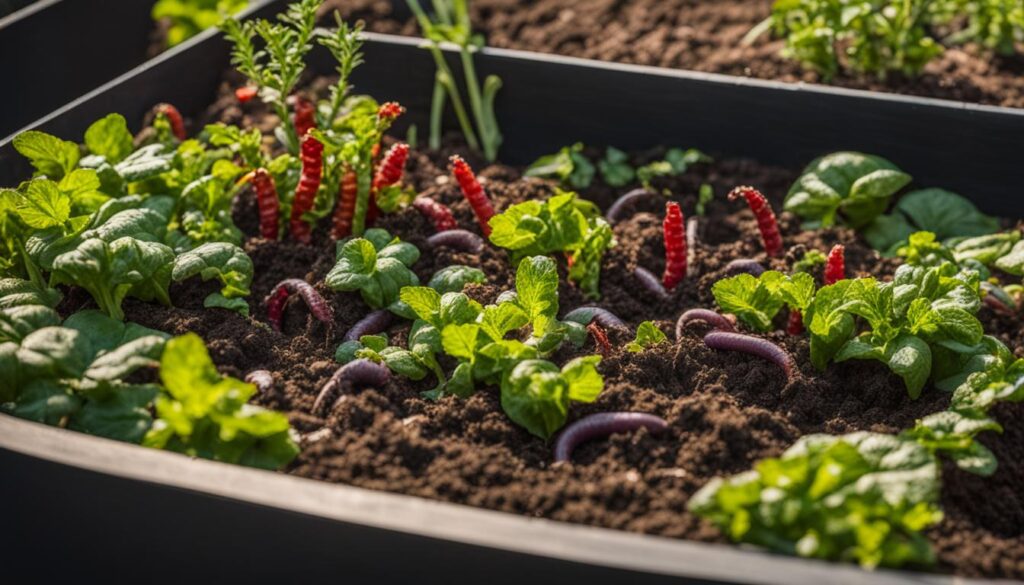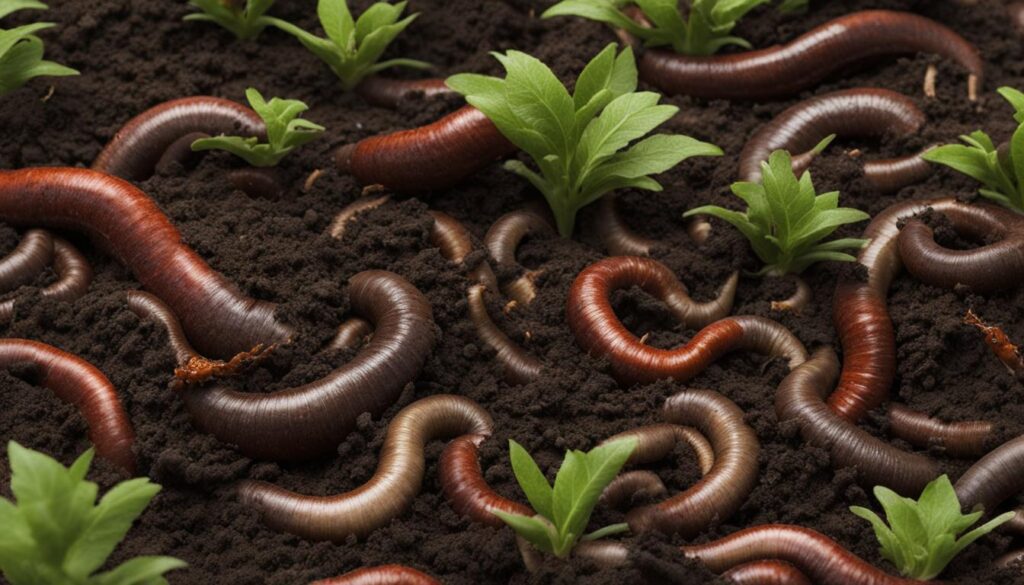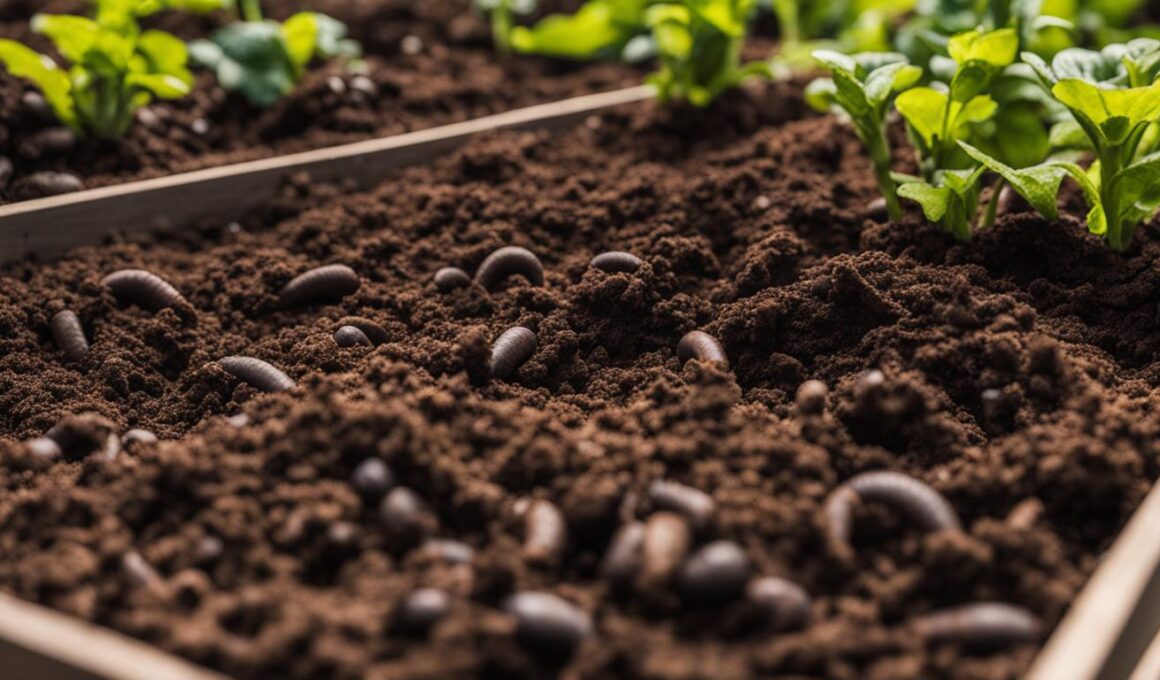Having worms in your garden can be a beneficial sign of a healthy ecosystem. However, it is possible to have excessive worm populations that can cause problems for your plants and garden bed. In this article, we will explore the dangers of having too many worms, how to determine if you have an overpopulation, and ways to control and prevent excessive worm populations. We will also discuss the benefits of having worms in your garden and provide tips for using earthworms effectively.
Post Summary:- Excessive worm populations can lead to plant damage, soil erosion, and attracting pests.
- Signs of excessive worms include poor plant health, an increase in pests, and bare patches in your garden.
- To control the worm population, you can physically remove them, use nematode spray, and reduce attractive factors like moisture and organic matter.
- Worms in your garden provide benefits such as soil aeration, improved nutrient content, and enhanced plant growth.
- Prevent excessive worm populations by practicing crop rotation, managing organic matter, proper watering, and debris removal.
The Dangers of Having Too Many Worms in Your Garden
Having worms in your garden can provide numerous benefits, but it’s important to be aware of the dangers that can arise when there is an excessive worm population. These dangers include plant damage, soil erosion, and attracting pests. Let’s take a closer look at each of these concerns:
Plant Damage
When there is a high concentration of worms in your garden, they can eat their way through the soil, causing damage to plant roots. The damage can leave plants vulnerable to diseases and further pest infestation. This can hinder the growth and overall health of your plants.
Soil Erosion
Excessive worm populations can contribute to soil erosion. As worms create tunnels and burrows, they loosen the soil structure, making it easier for erosion to occur. This can lead to the formation of bare patches in your garden, making it difficult for plants to take root and thrive.
Attracting Pests
Having too many worms in your garden can also attract pests like moles, beetles, and other insects. These pests can cause additional damage to your plants, undoing all the hard work you’ve put into maintaining your garden. It’s important to keep the worm population in check to mitigate the risk of attracting unwanted pests.
By being aware of these dangers and taking proactive measures to control the worm population in your garden, you can maintain a healthy and thriving garden. In the next section, we will explore how to determine if you have too many worms in your garden and what steps you can take to prevent excessive worm populations.
How to Determine if You Have Too Many Worms in Your Garden
Having worms in your garden can be a beneficial addition to your ecosystem, but it is important to ensure that their population remains balanced. If you suspect that you may have too many worms in your garden, there are a few signs to look out for.
First, check the health of your plants. If they are not growing well or appear stressed, it could be due to an overpopulation of worms damaging the roots. Additionally, an increase in pests such as moles, beetles, or aphids may indicate excessive worm populations, as worms tend to attract these pests to the area.
Another telltale sign of too many worms is the presence of bare patches in your garden. Worms consume vegetation, and if there are too many of them, they can eat all the plants, leaving bare areas where nothing can grow.
Signs of Excessive Worms in Your Garden
- Unhealthy or stressed plants
- Increase in pests such as moles, beetles, or aphids
- Bare patches in your garden
By keeping an eye out for these signs, you can determine whether you have an excessive worm population in your garden. It is important to address this issue promptly to prevent further damage to your plants and maintain a healthy garden bed.
Controlling the Population of Worms in Your Garden
If you find that you have too many worms in your garden, don’t worry – there are several effective methods for controlling their population. Here are some strategies you can implement:
1. Physically removing worms
To reduce the number of worms in your garden, you can manually remove them. Simply pick them up by hand and relocate them to another area. Alternatively, you can gently flush them out of the soil using a garden hose. Make sure to handle worms with care to avoid harming them.
2. Using nematode spray
Nematode spray is a natural and effective way to control worm populations. These microscopic organisms are natural predators of worms and can help reduce their numbers. Follow the instructions on the nematode spray package to apply it correctly in your garden.
3. Reducing attractive factors
Worms are attracted to moist environments, organic matter, and warm temperatures. By reducing these factors, you can discourage excessive worm populations. Avoid over-watering your garden and ensure proper drainage. Remove any decaying organic matter that may attract worms. Additionally, provide shade and ventilation to minimize warm and humid conditions that worms prefer.
By implementing these strategies, you can successfully control the population of worms in your garden. Remember to monitor the worm population regularly to maintain a healthy balance for your plants and soil. With proper control, you can enjoy the benefits of having worms while minimizing any potential drawbacks.
Benefits of Having Worms in Your Garden
Having worms in your garden can provide several benefits that contribute to the overall health and growth of your plants. These benefits include:
- Soil Aeration: Worms help improve soil aeration by creating tunnels and burrows as they move through the soil. This process enhances the circulation of air, water, and nutrients, which is essential for root development and overall plant health.
- Nutrient Content: As worms consume organic matter, they break it down into smaller particles, which increases the availability of nutrients for plants. Their digestive process enriches the soil by releasing nutrients such as nitrogen, phosphorus, and potassium, which are essential for plant growth.
- Improved Plant Growth: The presence of worms in your garden can lead to improved plant growth. The increased soil aeration and nutrient content create a favorable environment for plants to thrive. With healthier soil and an abundance of nutrients, plants can establish stronger root systems, develop vibrant foliage, and produce more flowers and fruits.
These benefits contribute to a more robust and productive garden, making worms valuable allies in organic gardening practices.

By understanding the benefits of worms in your garden, you can appreciate their role in maintaining soil health and plant vitality. However, it’s important to remember that moderation is key. While worms provide numerous advantages, an excessive population can lead to issues such as plant damage and attracting pests. Therefore, striking a balance in the worm population is crucial for optimal garden management.
Prevention of Excessive Worm Populations in Your Garden
Preventing an overpopulation of worms in your garden is essential to maintaining a healthy ecosystem. By taking proactive measures to control their population, you can ensure the well-being of your plants and prevent any potential damage. Here are some effective strategies to prevent excessive worm populations:
1. Crop Rotation
Crop rotation is a technique that involves planting different crops in different areas of your garden each year. This helps disrupt the life cycle of worms and reduces their population buildup. By rotating your crops, you decrease the chances of worms infesting a particular area of your garden and avoid creating an ideal breeding ground for them.
2. Organic Matter Management
Managing organic matter is crucial in preventing excessive worm populations. While worms thrive in soil rich in organic matter, it’s essential to strike a balance. Too much organic matter can attract an abundance of worms, leading to overpopulation. Regularly monitor and manage the amount of organic matter in your garden bed to prevent an imbalance that could favor excessive worm populations.
3. Proper Watering Techniques
Proper watering techniques play a significant role in controlling worm populations. Overwatering your garden can create a moist environment that attracts worms. To prevent this, water your plants deeply but infrequently, allowing the soil to dry out slightly between waterings. Additionally, consider using drip irrigation or soaker hoses to deliver water directly to plant roots and minimize surface moisture.
4. Debris Management
Keeping your garden free from debris is another effective way to prevent excessive worm populations. Piles of leaves, fallen fruits, or dead plant material can provide abundant food sources and shelter for worms. Regularly clean up any debris from your garden bed to discourage worms from congregating in one area and potentially multiplying beyond control.
| Preventive Measures | Effectiveness |
|---|---|
| Crop Rotation | High |
| Organic Matter Management | Moderate |
| Proper Watering Techniques | High |
| Debris Management | Moderate |
Implementing these preventive measures can help maintain a healthy balance of worms in your garden. By being proactive and taking steps to control their population, you can promote the overall well-being of your plants and create a thriving garden environment.
Tips for Using Earthworms in Your Garden
Earthworms can be incredibly beneficial for your garden, aiding in the decomposition of organic matter and improving soil quality. Here are some tips for utilizing earthworms in your garden:
- Composting: Using earthworms in composting can significantly accelerate the breakdown of organic matter. The worms consume the organic material and excrete nutrient-rich compost known as vermicompost. This compost can be used to nourish your garden beds, providing essential nutrients for plant growth.
- Adding to pots: Adding earthworms to your potted plants can enhance soil quality and plant health. The worms help to aerate the soil, improving drainage and root development. Additionally, their castings enrich the soil with nutrients, promoting healthier and more abundant plant growth.
- Vermiculture: Vermiculture is the process of using worms to turn kitchen scraps into compost. By creating a designated worm bin or vermicomposting system, you can utilize earthworms to recycle organic waste and produce nutrient-rich compost for your garden. Simply add your kitchen scraps to the designated bin, and the worms will break down the material, converting it into a valuable soil amendment.
By incorporating earthworms into your gardening practices, you can take advantage of their natural abilities to enhance soil health, increase nutrient availability, and improve plant growth.

| Method | Benefits |
|---|---|
| Composting | – Accelerates breakdown of organic matter – Produces nutrient-rich compost |
| Adding to pots | – Enhances soil quality – Improves plant health |
| Vermiculture | – Recycles kitchen scraps – Produces nutrient-rich compost |
As you can see from the table above, each method of using earthworms in your garden offers unique benefits. Whether you choose to compost, add them to pots, or implement vermicomposting, these practices can help you make the most of earthworms’ natural abilities and contribute to the overall health and productivity of your garden.
Does Having Too Many Worms in Your Garden Bed Affect the Growth of Plants in Soil or Sand?
Having too many worms in your garden bed can have an impact on plants’ growth in soil versus sand. While worms play a crucial role in improving soil fertility and aeration, an excessive population can lead to nutrient imbalances and crowded root systems. In sandy soil, this effect may be less pronounced due to its lesser nutrient-holding capacity. Nonetheless, maintaining a balanced worm population is crucial for optimal plant growth in any type of soil.
Conclusion
In conclusion, maintaining a balanced population of worms in your garden is crucial for optimal plant health. While worms can provide numerous benefits such as soil aeration, nutrient enrichment, and improved plant growth, an excessive worm population can lead to detrimental effects.
By monitoring the signs of excessive worms, such as plant damage, an increase in pests, and bare patches in your garden, you can take proactive steps to control their population. Physically removing worms, utilizing nematode spray, and reducing attractive factors like moisture and organic matter can help balance the worm population.
Remember to consider both the benefits and drawbacks of worms in your garden. While they contribute to a healthy ecosystem, an overabundance can result in plant damage and attract pests. By maintaining a balanced worm population, you can enjoy the advantages of improved soil health and thriving plants in your garden.
FAQ
Can having too many worms in your garden bed be harmful?
Yes, excessive worm populations can cause plant damage, soil erosion, and attract pests.
How can excessive worms harm your plants?
Excessive worms can eat plant roots, leaving them vulnerable to disease and pests.
What are the dangers of attracting pests with too many worms?
Pests like moles and beetles can cause further damage to your plants if attracted by an overpopulation of worms.
How can you tell if you have too many worms in your garden?
Signs of excessive worms include stressed or poorly growing plants, an increase in pests, and bare patches in your garden.
How can you control the population of worms in your garden?
You can physically remove worms by hand or flush them out with a garden hose. Using a nematode spray is another option. To prevent excessive worm populations, reduce factors that attract them and encourage natural predators.
What are the benefits of having worms in your garden?
Worms help aerate the soil, improve nutrient content, and contribute to healthier plant growth.
How can you prevent excessive worm populations in your garden?
Rotate your crops, use organic matter, avoid overwatering, keep the area free of debris, and regularly remove dead plants and leaves.
What are some tips for using earthworms in your garden?
You can use earthworms for composting, adding them to pots to improve soil quality, or practicing vermiculture to turn kitchen scraps into compost.









